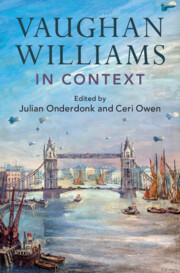Book contents
- Vaughan Williams in Context
- Composers in Context
- Vaughan Williams in Context
- Copyright page
- Dedication
- Contents
- Illustrations
- Graphs and Tables
- Musical Examples
- Notes on Contributors
- Acknowledgements
- Editorial Note
- Bibliographic Abbreviations
- Introduction
- Part I Biography, People, Places
- Part II Inspiration and Expression
- Part III Culture and Society
- Chapter 12 Politics
- Chapter 13 Liberalism and Landscape
- Chapter 14 The English Folk Revival
- Chapter 15 Christian Socialism and The English Hymnal
- Chapter 16 Pageantry
- Chapter 17 History and the Spirit of Revivalism
- Chapter 18 War
- Part IV Arts
- Part V Institutions
- Part VI Reception
- Further Reading
- Book part
- Index of Works
- General Index
Chapter 13 - Liberalism and Landscape
from Part III - Culture and Society
Published online by Cambridge University Press: 28 March 2024
- Vaughan Williams in Context
- Composers in Context
- Vaughan Williams in Context
- Copyright page
- Dedication
- Contents
- Illustrations
- Graphs and Tables
- Musical Examples
- Notes on Contributors
- Acknowledgements
- Editorial Note
- Bibliographic Abbreviations
- Introduction
- Part I Biography, People, Places
- Part II Inspiration and Expression
- Part III Culture and Society
- Chapter 12 Politics
- Chapter 13 Liberalism and Landscape
- Chapter 14 The English Folk Revival
- Chapter 15 Christian Socialism and The English Hymnal
- Chapter 16 Pageantry
- Chapter 17 History and the Spirit of Revivalism
- Chapter 18 War
- Part IV Arts
- Part V Institutions
- Part VI Reception
- Further Reading
- Book part
- Index of Works
- General Index
Summary
This chapter recovers the shifting ways in which landscape occupied the political and aesthetic imaginations of the group of radical liberals with whom Vaughan Williams spent his formative years. This generation of liberals was concerned with bringing the life of the mind directly to bear on the world at hand. It was a worldview that included particular assumptions about the processes of history, the future, and the role of the exceptional individual in the work of social reform, and which was made tangible through an affective relationship with landscape. Walking, cycling, and mountaineering became forms of spiritual exercise within a landscape that was ‘storied’ by family and national histories, and which exhibited the same processes of incremental change that were characteristic of certain liberal approaches to political, legal, and aesthetic reform. The chapter compares Vaughan Williams’s outlook with that of his close friend G. M. Trevelyan in particular, tracing the ways in which both men struggled to adapt their liberal values after the First World War. For Trevelyan, Vaughan Williams, and their liberal intellectual peers, a circumscribed vision of the landscape became emblematic of that feature of English political and legal history that tended towards incremental change, as well as the liberal sense of ‘continuity within change’ that arose as an expression of the importance of personal freedom and of national self-determination.
Keywords
- Type
- Chapter
- Information
- Vaughan Williams in Context , pp. 112 - 118Publisher: Cambridge University PressPrint publication year: 2024



